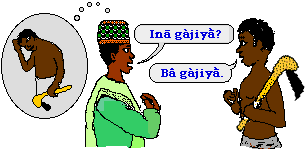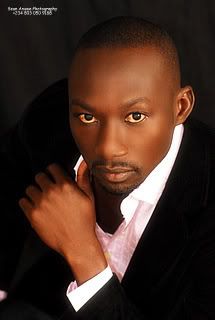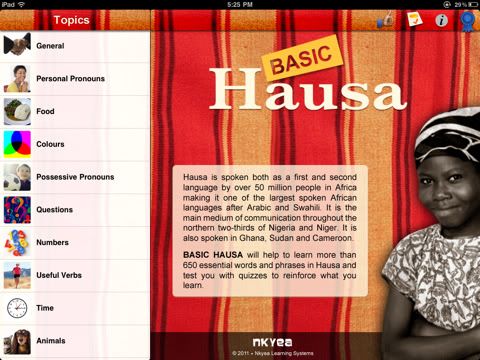L2: A Second Language [Featured Artiste: Dach-Mo]
My native language is NOT English. It is Yoruba. Are you shocked? I doubt it, but I will explain myself nonetheless. I define “native language” for myself alone, as the language spoken by members of my ethnic group. Being that I am from Lagos (Yes, I really am from Lagos), it is obvious why I would assert that Yoruba is my native language. But, the problem with this my definition is that it does not apply to everyone else. It is essentially “discriminatory,” the reason being that so many other people cannot define their native language the way I defined mine. In fact, some people would even argue with me that English is their native language. But, I disagree. While English is the OFFICIAL language of Nigeria because we were colonized by “Mama Sha-ly” and her people (okay, I ought to just say “The British,” but Mama Sha-ly sounded well….cooler! *grinning*), it is not our native language because we are not originally from England.
It is amazing how a person’s perspective can change just by living in another man’s land, and that is what happened to me. When I lived in Nigeria, I never really thought about language as per whether English was the official language, bla, bla, bla. In fact, I never had any desire to speak anything else other than English and maybe other European languages like French (call it “colo-mentality” as in “colonialism mentality” and you’d be quite correct). Fast-forward to a few years in the US, and my perspective has changed. Not only am I more interested in learning Yoruba, but my interest in learning Hausa has been re-kindled as well. Okay, let me explain.
It is amazing how a person’s perspective can change just by living in another man’s land, and that is what happened to me. When I lived in Nigeria, I never really thought about language as per whether English was the official language, bla, bla, bla. In fact, I never had any desire to speak anything else other than English and maybe other European languages like French (call it “colo-mentality” as in “colonialism mentality” and you’d be quite correct). Fast-forward to a few years in the US, and my perspective has changed. Not only am I more interested in learning Yoruba, but my interest in learning Hausa has been re-kindled as well. Okay, let me explain.
 |
| Ina gajiya?'How's the tiredness?' Ba gajiya.'There's no tiredness.' |
Anyway, back to the definition of “native language.” I am not sure what the native language would in the following hypotheticals:
- A person whose parents are from two different ethnic groups (Does that person claim BOTH languages as their “native language” or just one, possibly the father’s own? Though I have noticed that children tend to speak the language of their mother more fluently in such circumstances)
- A person who has one Nigerian parent and a parent from another country (What language does that person claim?)
I am sure there are other possible hypotheticals or scenarios, but those were the only ones I could think of right away. What I really wonder about is whether Nigerians even care about knowing or speaking their “native language,” whatever that may be. It seems like the emphasis is on English, which makes sense since that’s the main vehicle of communication that the rest of the world uses. But, apart from speaking English fluently, how many Nigerians can speak at least ONE Nigerian language fluently (or at least speak it “fairly well”)? How many Nigerians are interested in learning to speak ONE Nigerian language, talk less of a SECOND language? I think the answer to that question is: Not many. Sadly. In addition, I have noticed a certain fear with respect to speaking Nigerian languages and English, i.e. it seems like a lot of people think that if you can speak your native language fluently, it somehow “colors” your English, i.e. your spoken English will be poor. Basically, a lot of people think there’s some kind of tradeoff between English and any other Nigerian language, so it is either one or the other. So, those who want their children to speak “correct” English either completely discourage them from speaking their native language or they emphasize English to the detriment of the Nigerian language (*pardon my using “native language” and “Nigerian language” interchangeably, but you get what I mean, right?*) At the same time, I have met people who speak English fluently and their native language just as fluently, and the two languages apparently “co-exist peacefully.” So, I am curious. What has your own experience been?
Featured Artiste: Dach-Mo
I know I have featured Dach-Mo on another blog post, but I recently came across a video of another one of his songs, titled “BABU.”
 |
| Dach-Mo |
And being the generous person that I am (*batting eyelashes*), I decided to share it with you. Plus, this song is completely in Hausa, which is a language I am very interested in (Thanks Relentless! Like you didn’t already mention that!) Furthermore, the video features some well-known and upcoming artistes who are from Jos (or at least live there). Okay, without rambling any further, here is Dach-Mo singing “BABU.” Enjoy and have a great weekend!
Babu (Audio):
Babu (Video):
Images From: Itunes, ReverbNation, UCLA



I know my native language well, I don't think speaking one native language will affect one's spoken english. I know people with correct British and American accents that can speak Nigerian Language(s) well
Am not fluent in my native language...ENGLISH was a MUST in our home then...but now, me think my parents are kind of regretting it....i put it down to colonial mentality as you said ....Nigerians are coming to appreciate themselves, hence, the awareness....am not happy i cannot teach my kids ESAN but hope they learn YORUBA from their dad.
There is actually a blog challenge going on where people are supposed to make a post by recording the audio in their native Nigerian language or any one they can speak well or not so well. I've been listening to some of them and it takes me back to naija for sure. I can speak Igbo and some words of both Yoruba and Hausa. Maybe I'll do the post...
Love the new look of your blog:) I enjoyed reading this post, I have noticed over the years that educated folks who speak their native language very well, speak English so well too. In primary school I remember my teachers always trying to discourage us from speaking vernacular, lol.
Love the new look of your blog:) I enjoyed reading this post, I have noticed over the years that educated folks who speak their native language very well, speak English so well too. In primary school I remember my teachers always trying to discourage us from speaking vernacular, lol.
Relentless! You always make me laugh! I've thought about the whole native language thing a lot since growing up and I think you hit the nail on the head when you mentioned something along the lines of parents being worried that it would affect their kids' English! I remember being in secondary school and somehow having the warped idea that girls that could speak their native language fluently were basically, bush. I think differently now though, and I wish I could speak Igbo as well as some other people I know; I don't think it would've had any negative effect on my English. At least I understand it, so all is not lost, but the problem most people (i.e. me) have is that if you can't speak it fluently, you feel a bit embarrassed to speak it at all, and then obviously you don't get any better and your confidence doesn't grow, and so the cycle continues... I think it really does depend on the parents; if you speak the language to your kids, they will learn it by force! :)
"Why is it that when a person is learning a new language, na de bad bad things de person dey first learn?"You are quite right about that. There is usually a tendency to learn the bad things first. lol | Ur mum didn't do anything other than stare? HAHA... Did she understand what it meant? lol I am trying to imagine she did and the look on her face.. lolI can speak hausa as I lived in the north for 6years of my life. I also can speak very little igbo as we once had igbos as neighbours for quite sometime too.. See.. I am a true Nigerian but my native language is Yoruba jor.. all the way from EKITI! - LDP
@833b284b6c571e84f2bfc2137ea1a47a:disqus
It's really good that you know your language well (which is more than I can say for myself), but you didn't say what your language was...And you're right. I have also met Nigerians who speak English fluently and also speak their own language just as well...I think that's a blessing, really.
Kibhade:
Awwww! You're not?! That makes two of us. While I would like to claim that I am fluent, the truth is that I have to use a lot of English words for the Yoruba words I don't know. And just like you, English was over-emphasized at home, so the little Yoruba I know was not learnt from my parents, per se. I also hope your kids learn to speak at least one language though, like you said. Let's just blame it all on "colo-mentality"...LOL!
Myne:
Yes o! I just found out about that blog challenge and I hope you do the post soon. I think it'll be interesting to hear you speak those languages you can speak. Maybe some of us will pick up a few words too! And you can speak 3 languages? Wow! Impressive!
Trinkettz (a.k.a Titi's Passion):
Thanks so much for the compliments (or maybe I should thank the designer....LOL!) I am glad you enjoyed reading the post. Just like you I have met people who can speak both English and their native language well, but I have also met those who can only speak English and blame their reluctance to learn their native language on the perceived effect it will have on their English. And yes o, me sef I remember teachers emphatically forbidding anyone from speaking vernacular...Can you imagine?!
Trinkettz (a.k.a Titi's Passion):Thanks so much for the compliments (or maybe I should thank the designer....LOL!) I am glad you enjoyed reading the post. Just like you I have met people who can speak both English and their native language well, but I have also met those who can only speak English and blame their reluctance to learn their native language on the perceived effect it will have on their English. And yes o, me sef I remember teachers emphatically forbidding anyone from speaking vernacular...Can you imagine?!
Trinkettz (a.k.a Titi's Passion):Thanks so much for the compliments (or maybe I should thank the designer....LOL!) I am glad you enjoyed reading the post. Just like you I have met people who can speak both English and their native language well, but I have also met those who can only speak English and blame their reluctance to learn their native language on the perceived effect it will have on their English. And yes o, me sef I remember teachers emphatically forbidding anyone from speaking vernacular...Can you imagine?!
Renny:
Hehehe! Laughter is a good thing now, so I am glad you got to laugh! Just like you, I grew up with the erroneous notion that people who spoke their native language fluently were "bush" ... Needless to say I no longer share that belief today! It's good that you at least understand it. I don't think it is ever too late to learn your language, especially since there are tons of resources out there to help you. Plus, the cycle you described is quite true, so I guess if you want your kids to speak Igbo, you might want to start working on it now...LOL! You'll be surprised at how much improvement you'll see even at this stage, so don't be discouraged at all. Just start.
LDP:
Yes o! Na de bad bad things person dey first learn...And yes now, my mummy only stared at me! I was not within "flogging" or "slapping" range and God was on my side that day...LOL! She understood what it meant AFTER I interpreted it for her...LOL! Hence, the stare...
I think if you can speak all the other Nigerian languages (not just the 3 major ones), then you can claim the title of "True Nigerian"....LOL! Don't mind me o! 3 is good enough and you're lucky to have learnt 2 extra ones. So you're an Ekiti man?! Ah! I hail o!
I would consider me lucky to understand my native language. It's really
fun to hear others speak too. Hausa is cool o, heard its the easiest to
learn but I still see it as Chinese.
Michael:
You would consider yourself lucky? Does that mean you understand it or you're trying to understand it? LOL! Either way, it's good to hear people speak their own language, not just English.
Plus, Hausa has this "sing-song-ness" to it...Okay, let me stop before I overly-romanticize the language! LOL! And you're right. I found it easier to learn Hausa than Yoruba, believe it or not. LOL @ seeing it as Chinese. You can still learn it now...
Thanks for stopping by!
When i was younger i didn't care about languages. i regret that now and i'm trying to rectify it. Wish me luck :) I'm learning Hausa as well as my native language (which i can hear but not really speak) *sigh*
Lovely template btw
Adiya
Muse
Origins
Muse
Origins (formerly The Corner Shop)
Adiya:
I feel you on the regret part, but I am glad you're at least making the effort to learn not one, but 2 languages. By the way, you didn't tell me what your native language was o!
And thanks for the compliments on the template!
POST A COMMENT
I would love to hear your thoughts. Please Share.